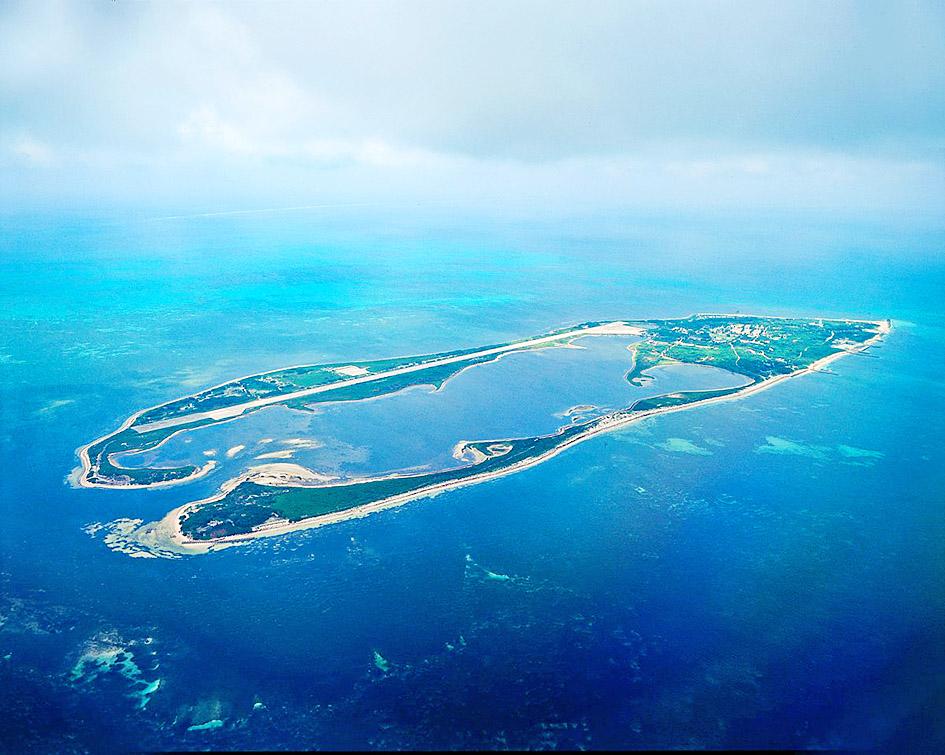Minister of National Defense Yen De-fa (嚴德發) yesterday called on Beijing to respect international aviation rules and refrain from undermining air travel after Hong Kong air traffic controllers on Thursday morning warned off a Taiwanese flight.
A military chartered supply flight operated by Uni Air (立榮航空) from Kaohsiung to the Taipei-controlled Pratas Islands (Dongsha Islands, 東沙群島) in the South China Sea was forced to turn back on its way to the disputed islands, where 250 Taiwanese coast guard personnel are deployed, the Civil Aeronautics Administration (CAA) said.
Hong Kong air traffic controllers denied the Uni Air ATR2-600 aircraft authorization to enter the Hong Kong Flight Information Region (FIR) because of “dangerous activities” being conducted in the area, the CAA said.

Photo courtesy of the Water Resources Agency via CNA
The ministry did not find any Chinese military exercises being conducted in the region, Yen said.
There was “nothing abnormal” there, he said, adding that the Chinese Maritime Safety Administration had not issued an aviation ban, meaning that normal passage was allowed in the region for any flight meeting international aviation regulations.
“We hope the Chinese authorities will respect the rules set by international aviation organizations, take international aviation safety seriously and refrain from destroying the international aviation order,” Yen said.
The supply plane took off from Kaohsiung International Airport at 9:05am, was turned away about 40 minutes later and returned to the airport at 10:22am, the CAA said.
About 50 to 60 nautical miles (about 93km to 111km) before entering the Hong Kong FIR, air traffic controllers told the pilot that the aircraft was not allowed to enter, the CAA said.
The pilot tried to ask when the “dangerous activities” would end, but received no response and eventually decided to return to Kaohsiung, it said.
The Pratas Islands — administered by Taiwan, but also claimed by China — are about 310km southeast of Hong Kong and are within its FIR.
It has been standard practice for Taiwanese air traffic controllers to inform their Hong Kong counterparts whenever a plane in the Taipei FIR is about to enter the Hong Kong region and is about 20 to 30 nautical miles away.
Hong Kong air traffic controllers should have issued an advance “notice to airmen” if there had been hazards along the route, but no such notice was given on Thursday, the CAA said.
The Hong Kong Civil Aviation Department yesterday said that it received a notice of the aircraft’s planned entry into the region and reminded Taiwan’s air traffic controllers that the aircraft must stay above the minimum safe altitude.
Taiwan’s air traffic control center told it to cancel the request for the Uni Air flight to enter the FIR, the Hong Kong department said, adding that it followed protocol in handling the situation.
The Pratas Islands have taken on extra significance since pro-government protests began in Hong Kong last year.
Taiwan has intercepted at least one boat near the region carrying people fleeing from Hong Kong trying to make their way to Taiwan.
Some Taiwanese officials have expressed concern that China could attempt to seize the Pratas Islands, a drastic escalation of tensions that could lead to war.
Additional reporting by Reuters

CHAOS: Iranians took to the streets playing celebratory music after reports of Khamenei’s death on Saturday, while mourners also gathered in Tehran yesterday Iranian Supreme Leader Ayatollah Ali Khamenei was killed in a major attack on Iran launched by Israel and the US, throwing the future of the Islamic republic into doubt and raising the risk of regional instability. Iranian state television and the state-run IRNA news agency announced the 86-year-old’s death early yesterday. US President Donald Trump said it gave Iranians their “greatest chance” to “take back” their country. The announcements came after a joint US and Israeli aerial bombardment that targeted Iranian military and governmental sites. Trump said the “heavy and pinpoint bombing” would continue through the week or as long

TRUST: The KMT said it respected the US’ timing and considerations, and hoped it would continue to honor its commitments to helping Taiwan bolster its defenses and deterrence US President Donald Trump is delaying a multibillion-dollar arms sale to Taiwan to ensure his visit to Beijing is successful, a New York Times report said. The weapons sales package has stalled in the US Department of State, the report said, citing US officials it did not identify. The White House has told agencies not to push forward ahead of Trump’s meeting with Chinese President Xi Jinping (習近平), it said. The two last month held a phone call to discuss trade and geopolitical flashpoints ahead of the summit. Xi raised the Taiwan issue and urged the US to handle arms sales to

A magnitude 5.6 earthquake struck off the coast of Yilan County at 12:37pm today, with clear shaking felt across much of northern Taiwan. There were no immediate reports of damage. The epicenter of the quake was 16.9km east-southeast of Yilan County Hall offshore at a depth of 66.8km, Central Weather Administration (CWA) data showed. The maximum intensity registered at a 4 in Yilan County’s Nanao Township (南澳) on Taiwan’s seven-tier scale. Other parts of Yilan, as well as certain areas of Hualien County, Taipei, New Taipei City, Taoyuan, Hsinchu County, Taichung and Miaoli County, recorded intensities of 3. Residents of Yilan County and Taipei received

Taiwan has secured another breakthrough in fruit exports, with jujubes, dragon fruit and lychees approved for shipment to the EU, the Ministry of Agriculture said yesterday. The Animal and Plant Health Inspection Agency on Thursday received formal notification of the approval from the EU, the ministry said, adding that the decision was expected to expand Taiwanese fruit producers’ access to high-end European markets. Taiwan exported 126 tonnes of lychees last year, valued at US$1.48 million, with Japan accounting for 102 tonnes. Other export destinations included New Zealand, Hong Kong, the US and Australia, ministry data showed. Jujube exports totaled 103 tonnes, valued at